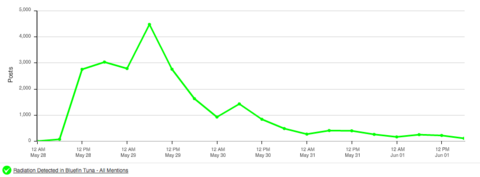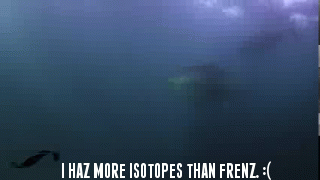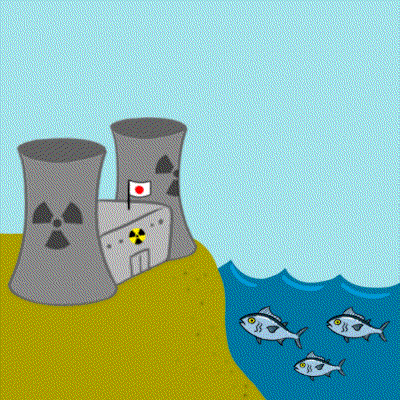Radioactive Tuna + #worldoceansday + OpenROV + ICCB Livetweeting Stats: Sea Signals for the Week of May 28
#worldoceansday
We’re gearing up for World Oceans Day (June 8) here at Upwell, and had a good chat with the organizers about how we can support their work. One of the things we’ll be working on next week is to help amplify the #worldoceansday hashtag on Twitter , and the call for folks to upload a photo with their World Oceans Day pledge.
We hope you’ll join us by using the #worldoceansday all next week, and sharing your World Oceans Day photo + pledge.
Radioactive Tuna
On May 28, the AP reported that Bluefin Tuna were arriving in California after a very long swim from Japan, and were carrying small amounts of Fukushima-related radioactivity. This news spread quickly, as a story with “radioactive” in the headline is wont to do.
The scientific takeaways of the tuna study had little to do with the health effects, and much more to do with implications for tracking fish. The amount of radioactive cesium found in the fish was actually far below levels that would be considered unsafe.

Online mentions of the radioactive bluefin tuna story, May 28th - June 1st, 2012
This story hit Upwell’s radar like a hurricane. Our big questions were, how can we expand on this conversation without playing into fears? And, even if we do play into fears, is there a way to pivot the conversation to key people into the other issues affecting bluefin?
Amplification & Reaction
The conversation about this was already happening big. Knowing that the story had hit the mainstream, we decided to make an animated gif to bring the story to new online audiences likely to have lively conversations: Tumblr and Reddit. Our gifs:
We asked our networks for a big Tumblr-er or Redditor. We found some, but Redditors in our network are highly educated on radioactive risks, and viewed further amplification of the news as fearmongering. Reddit founder Alexis also responded to our request for help, letting us know that there are no superstar Redditors.
We shared the gifs with some tumblrs that catalog animated gifs. One of the gifs was featured on .gifs i use.
We also posted the gifs to Reddit ourselves, knowing that without a lot of Reddit karma, we were unlikely to get many upvotes. That turned out to be a safe assumption. We also linked to the gifs in comments on links to radioactive tuna stories that had been upvoted on Reddit.
Lastly, we included one of the gifs in a comment on Facebook. That got one like.
We shared them on Twitter as well, and got one retweet by @Twyspy. hooray.
As of June 4, the gifs have been viewed over 250 times.
We also did a couple traditional media pitches. Since the story was covered in most major news outlets fairly quickly, we focused on providing a new angle. We asked USA Today (who hadn’t covered the story yet) to take a broader look at food safety issues around seafood. We wrote On the Media to see if they’d like to look at how the media had covered the story, asking whether the sensational headline was misleading. USA Today did not want to cover the story, saying it had already run its course. On the Media did not respond.
We Learned
With a story like this, it’s important to act fast. The release of the story to mainstream media happened over a holiday weekend, and we had no advance notice from Scripps or the people in our network who had advance knowledge. The conversation got big quickly, and our monitoring allowed us to track the spike in attention.
The animated gif experience was a huge learning experience. While fun, they are incredibly difficult to make popular, since Facebook and Twitter are not good outlets for sharing them. Reddit remains a powerful tool that we will continue to explore, but using it successfully may require us to befriend a few champion Redditors. (Are you one? let us know!)
We want to continue to experiment with animated gifs but know that in order for them to achieve meme status, they’ve got to be a bit more clever than cute, and have a clear message.
This story became popular because of fear. Is radioactive cesium in your tuna a terribly scary thing? To most people, yes, but the science says it won’t do us any harm in such a small amount. Amplifying a story like this made us consider carefully how spread good science without fearmongering or skirting around the truth that radioactivity is, indeed, scary.
OpenROV
On May 28th, The New York Times published a piece by Brian Lam, A Mini Sub Made From Cheap Parts Could Change Underwater Exploration, about an open-source underwater robot.
Amplification & Reaction
We reached out through Twitter and email to a couple folks we know who love robots, and through Twitter to a robot-focused blog. One individual tweeted about the article, which caused a RT.
We also shared the link to the NYT article via Twitter to Upwell’s followers, and in a separate tweet, we shared a link to a video of the robot being tested in a cave. Both links received the same amount of clicks, but the tweet about the video was RTd and favorited.
We Learned
We’re wondering if perhaps we should have shared the video, rather than the article to the NYT article as seeing a robot in action is possibly more interesting than reading about it, or seeing a photo of it.
ICCB Livetweeting Stats Analysis
Working with David Shiffman (@WhySharksMatter) we contributed data analysis for a manuscript documenting his work livetweeting the 2011 International Congress for Conservation Biology. In order to better understand the impact that Twitter had on the online conversation surrounding ICCB, Upwell analyzed over 4,000 occurrences of the Twitter hashtag #ICCB, filtering out similar, but unrelated uses of the term (such as tweets mentioning the Ireland Colliery Chesterfield Band, who gave a performance during the week of ICCB).
The resulting analysis clearly demonstrated the benefits—in both conversation and overall attention—of having an active livetweeter, especially a passionate subject-matter expert like David.
We look forward to sharing an in-depth look at our findings with you here soon, as soon as David’s manuscript has been published. Stay tuned!


Add a comment